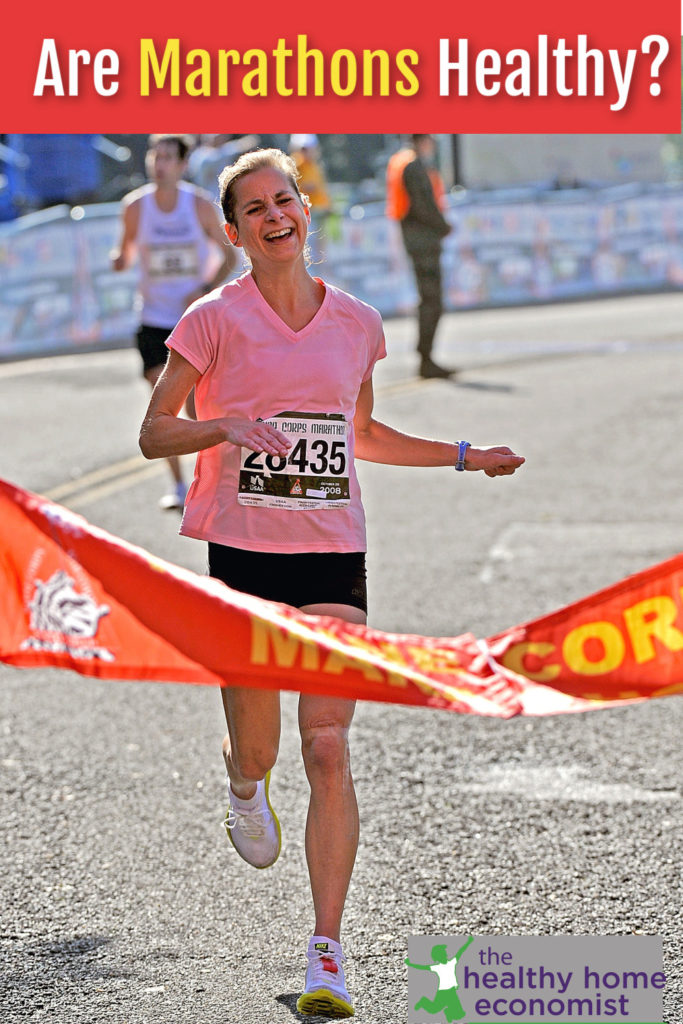Table of Contents[Hide][Show]
Reasons to reconsider preparing and running a marathon due to the long-term health risks that scientific research is beginning to uncover and medical professionals are increasingly warning their patients about. The dangers to cancer patients or those in remission is especially worrisome!
Have you ever noticed that marathon runners in the Olympics look overly thin and in some cases, even weak?
Have you ever wondered why marathons are considered beneficial in our society yet the first person that ever ran one collapsed and died immediately after?
Yeah, and Pheidippides was fit too, likely selected for his job as a herald due to his speed and distance running ability. He was not some ancient Greek version of the modern couch potato.
While life may be a marathon your training program should not be. Running a half or whole marathon or competing in a triathlon are all admirable goals. But there are many dangers associated with excessive endurance training.
Dating as far back as the 1970s, the misconception of mainstream training philosophies that 45 minutes to an hour or more a day of intense aerobic activity has led to an overtrained, unfit, immune-compromised exercising population.
Humans were not designed for movement at a chronically sustained high-intensity aerobic pace.
We’ve all seen it in the local gym–day in and day out, week after week Jane and John plod away on the treadmills and ellipticals or pedal themselves into exhaustion in spin classes. It has done nothing to shed the extra fat on their butts and guts let alone tone them. I have never been impressed by any of these results.
13 Health Risks from Marathon Running
What exactly are the problems caused by training for long periods of time at high intensities such as what occurs when preparing/running a marathon?
Even if you take care to eat plenty of clean grassfed collagen and regularly take natural sources of Vitamins A/D and K2 to keep the bones and joints strong, many things can, in fact, start to break down from the continued punishment. This is particularly the case if you are over 30 . . . (1-5)
- Debilitating osteoarthritis . . . at a young age
- Permanent scarring of the heart muscle
- A weakening of the thyroid and adrenal glands
- Tendonitis and other repetitive strain injuries
- Recurrent upper respiratory infections
- Permanently damaged feet (my chiropractor says long-distance runners have some of the worst feet he’s ever seen)
- Increased oxidative damage (free radical production)
- Decreased fat metabolism
- Susceptibility to injury
- Loss of bone density
- Depletion of lean muscle tissue
- Hormone imbalances that are difficult to rectify (women)
- High refined carbohydrate intake promotes a dangerous level of continuous systemic inflammation.
Heart Surgeon Stops Doing Marathons
Dr. Peter McCullough, chief of cardiovascular research at Baylor Heart and Vascular Institute in Dallas, has completed 54 marathons, one in every state. But he stopped running marathons after examining research showing the potential dangers. He said:
I thought there was enough evidence that I wasn’t willing to pay the ultimate price.
I’m convinced that to go grind it out for hours on end at a steady pace is the wrong thing. Some experts are divided about this, and the concern is that it could dissuade some people from exercising, but we just can’t bury our heads about it. (2)
If you still are doubtful about the health risks from marathon running, consider how frequently one or more people die running them during competition. Even the very young are not immune. In 2019, a fit, healthy 22-year-old woman who played soccer for a nearby university died near the finish line of the Cleveland marathon. (6)
Excessive Cardio and Chronic Inflammation
The sad part of stories like this is that the intentions are good. They are doing this all in the name of “health”. They are certainly not out to destroy it.
Aside from the dangers mentioned above, why is high-intensity aerobic pursuit such a dead end?
One reason is the high level of carbohydrates consumed needed to sustain this activity leads to chronic inflammation.
You’ve probably seen it. Sally and Johnny are running a 5K so they load up on a big bowl of pasta the night before the big race. Then, they chow down on bagels and juice immediately after their 36 min run. A cascade of systemic inflammation follows.
More Running is NOT Better
Research presented at the American College of Cardiology Scientific Sessions in Washington showed a shocking finding that should give every marathoner pause.
Runners who average more than 20 miles a week don’t live as long as those who run less than 20 miles a week.
On average, those running more than 20 miles a week live about the same as people who don’t run much at all. (7)
Cancer Patients Particularly at Risk
Even worse are people in cancer remission logging mile after mile thinking it is going to keep cancer from returning. More often than not, it returns with a vengeance with a more dire prognosis than before.
Why? All the free radicals flooding their already weakened system from overexercising on a usually low-fat diet.
Folks with cancer courageously yet misguidedly doing half marathons and marathons are literally running themselves right into the grave.
Simply put, humans are not designed to exercise like this! We have 2 primary energy systems to power our muscles. The first relies on the slow-burning of fats keeping us fueled while at rest yet allowing for a continuous low-level aerobic activity such as walking, gardening, and day-to-day physical tasks. Fat is a very efficient fuel, stored and burned easily and cleanly when lots of oxygen is present.
Our second primary energy system that evolved is an ATP-fueled system that allows us to do intense loads of work in shorts bursts. It is our high octane fuel. Think of the woman that lifts a car off her child trapped beneath it. Or the person that sprints after a mugger to get their wallet back. In other words all-out effort for fewer than 20 seconds; flight or fight and life or death tasks and situations.
Our energy systems are far more complex than that but it boils to the fact that we were evolved to either move slowly and steadily or briefly and fast. We become both healthier and stronger by exercising and living in this manner.
Are Half-Marathons or Triathlons Dangerous?
All things being said, there are still people out there that want to run a half marathon or triathlon. Even at these shorter distances, they still need to be careful. (3)
The good news is that there is a better and smarter way to train for an endurance event while avoiding the negative risks mentioned above.
The days of logging mileage in excess of 20+ a week have become outdated and misinformed.
And so is the weak and skinny appearance of the stereotypical endurance athlete!
Combine Strength and Conditioning with Interval-based Training
Many are finding that by incorporating strength and conditioning workouts into their training routine along with shorter more interval-based training they are improving speed, power, and overall performance. This approach also reduces injury potential. Not to mention having a lot more free time, less pain and, quicker recovery, and no long-term scarring/damage to the heart.
This has been hotly debated but well documented in the past several years. Leading the pack in the defense is CrossFit Endurance’s, Brian MacKenzie. His training has many top-level endurance athletes setting personal records far beyond past efforts with a dramatic reduction in training time and mileage.
Fitness can and should be achieved without the need for pounding the pavement for miles on end, a huge daily time commitment, and a long list of extreme risks to health both short and long term.

References
(1) Potential Adverse Cardiovascular Effects from Excessive Cardiovascular Endurance Exercise
(2) Is Long-Distance Running Good for the Heart?
(3) Triathletes May Be Putting Their Heart at Risk
(4) Marathon Running Can Scar the Heart
(5) Exercise and Your Health (Myths about Exercise)
(6) 22-Year-Old Woman Dies During Cleveland Marathon
(7) More Running May Not Help You Live Any Longer








Shame on you. Poor timing, poor taste, lacking sources…. On Boston weekend? Running makes people happy. It releases endorphins. The finish line of a marathon trumps the finish of any WOD for some people, and to post this stereotypical generalization of anyone that runs marathons is offensive, and is exactly what gives Crossfit a bad name. I love both, but I’m tired of the holier than thou attitude that Crossfitters often project. And, to talk about the “appearance” of runners… Really? People are born with different body types, different amounts of fast and slow twitch muscles. Skinny dudes are great, if it’s natural and healthy. Chicks with bulky muscles are great, if it’s natural and healthy. And, lastly, why don’t you go run a marathon…. Before preaching about how unhealthy it is.
So interesting! People always say training for a marathon is so healthy and will add years to your life. Even if that’s true, they’re likely to spend all of that time if not more, running. Lol, no thank you!
This seems in bad taste on marathon weekend, esp promoted by crossfit trainers that make money on these “facts.”
Your assuming that people evolved. Evidence is showing that people are actually devolving and that the primary source of energy that the human body likes to run on is carbs – sugars, starches…
There is absolutely NO evidence that shows or even suggests that people are ‘devolving’. ‘Devolving’ isn’t a thing that is possible – you, like many people, have been the victim of poor teaching on the subject of ‘evolution’. Evolution merely means that a type of organism is changing through random mutation over many generations – it doesn’t necessarily mean that the type of organism is improving through random mutation over many generations.
I watched a great set of videos by an isometrics expert and he was also talking about how damaging to the heart running can be.
This is a very broad generalization about half marathoning and marathoning. While many people have had injuries (myself included) I can tell you it is because they are either increasing their mileage ridiculously fast not having run a marathon before or are not following a proper training (that includes strength and conditioning training nor a proper nutrition plan that supports the body through the training. I just think the generalizations made about long distance running are very broad.
By the way, the fact that this was written by a Crossfit trainer says a lot about it. Nothing personally against them but they are well known for advocating against any type of long distance running.
*on the subject of nutrition, etc.
Seriously?!?!?! Maybe for some people, yes. But, on the subject of injuries, I have seen them occur with other sports as well. Shaking my head in disbelief.. Take care of your body~ inside and out. If an injury occurs, seek medical advice sooner rather than later. Educate yourself nutrition, etc..
http://www.marksdailyapple.com/the-evidence-continues-to-mount-against-chronic-cardio/#axzz2zTZTvh6r
Wow! I’m learning so much having Hypothyroidism!